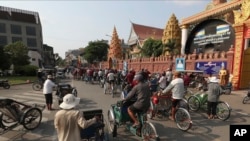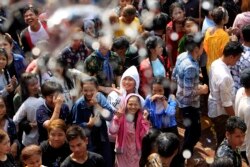The Cambodian government Thursday evening announced a one-week travel ban within the country, preventing all travel between provinces, and even districts, on account of concerns garment workers were planning to disobey orders to work through Khmer New Year.
The order, which was signed by Hun Sen on Thursday, will come into effect at midnight Thursday and last one week till April 16, spanning the entire duration of the annual Khmer New Year holidays, which have been canceled this year due to the coronavirus pandemic.
“For national safety and the lives of people, I have no better choice than to issue this order,” Hun Sen said on his Facebook page, publishing the two-page order.
The travel ban prevents any travel between Phnom Penh and the 24 provinces, though movement within the capital will continue unabated. Traveling between other provinces, with movement down to the district level, has been prohibited.
All vehicles found traveling between the areas will be prohibited, except for those carrying government officials and those used for essential services, such as goods trucks, medical vehicles, and sanitation services.
Transportation vehicles for garment workers, who will have to work through the now-canceled holiday, will be permitted to ferry workers to and from work, as long as they are registered or have an approval letter from the Labor Ministry or provincial departments.
The government has so far displayed an inconsistent stand on the pandemic’s spread in Cambodia. While downplaying the spread of the coronavirus for nearly two months, it has at the same time periodically shut down the borders with Thailand and Vietnam, banned public events and spaces, closed schools and recently asked spas and massage parlors to shutter.
However, it did not cancel flights from other countries when international travel was still prevalent and only recently placed restrictions on foreign arrivals, but at the same time has enforced this travel ban and is actively considering a state of emergency.
Hun Sen, who just two days ago said there was a “0.01 percent” chance he would enact the draft “state of emergency law,” which has yet-to-be-passed in parliament, said in his Facebook post he had changed his mind.
“If [we] would have had the Law on National Administration in the State of Emergency, it would have been implemented now,” he said, referring to the official name of the draft legislation.
At a Tuesday press conference, Hun Sen said he was canceling the Khmer New Year holidays because workers were planning to leave Phnom Penh despite having to work, which would exacerbate the country’s novel coronavirus tally, which now stands at 118 total cases.
“If [we] allow them to go freely, the situation after Khmer New Year will be at higher risk,” he said. “Now people in the countryside are afraid of people from the city bringing the disease, as people in the city worried about infection.”
Additionally, Heng Sour, spokesperson for the Labor Ministry, posted on Facebook Wednesday that any workers who flouted the order to continue working through the holidays would be placed in 14-day quarantine without pay.
Given that the draft “state of emergency” has not been promulgated, it was not entirely clear what law or constitutional articles were being used as a basis for the travel ban.
The “state of emergency” draft law has been strongly criticized by rights groups for giving the government sweeping powers to curtail fundamental rights and to enact martial law.
Government spokesperson Phay Siphan said the Constitution gave the executive branch the responsibility to maintain the “safety of the people,” enabling the issuance of a travel ban.
“We don’t have any problem because it is the royal government’s obligation to maintain safety for people,” he said, adding that it would not be hard to implement the prime minister’s order.
“The order is in the people’s interest and for the safety of the people and the whole nation,” he added.
Hours prior to issuing the order, leaked audio of Hun Sen had the prime minister saying there were “some workers seemed to disagree” with the decision to work through the holidays next week.
“I wanted to order in a way that prohibiting traveling from one province to another,” he said in the short clip, seemingly an audio memo.
“And all taxi vehicles are not allowed to travel during this time and only to limited areas. We need to take certain measures, otherwise, the country will be destroyed,” said Hun Sen in the audio, instructing Interior Minister Sar Kheng and Minister for the Council of Ministers Bin Chhin to draft the order.
Yang Sophorn, president of workers union Cambodian Alliance of Trade Unions, said “there were workers who were unhappy” with the government’s decision to cancel the Khmer New Year holidays and keep them working in the factories.
“Workers don’t have the feeling to work and they can’t concentrate on work,” she said. “It is the decision of workers whether to stay or go home,” she added.





